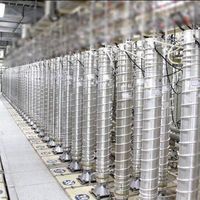Israeli opposition calls to avenge Iran-backed attack on PM home
After Israeli strikes across Iran at the weekend, opposition figures are calling for further action against Iran, saying they did not go far enough.
On Sunday night, members of parliament raised the idea of a further attack, saying that the weekend’s retaliation for this month’s ballistic missile barrage by Tehran failed to avenge the drone attack that targeted long-time Prime Minister Benjamin Netanyahu’s home in Caesarea earlier this month.
A government source told Iran International, “There is a feeling that the attacks this weekend weren’t enough to also avenge the attack on the Prime Minister’s home.”
While the parliament does not have the power to decide on military strategy, reserved for the war cabinet, it has become a political opportunity for Netanyahu’s rivals such as former Prime Minister Yair Lapid, to portray him as weak while the country battles Iran’s proxies across the country’s borders.
“It’s a political, not a strategic discussion,” the source added, stressing that it was not necessarily reflective of the military leaders’ policy.
Israel's Channel 13 said the security cabinet discussed the topic for "long hours," reporting that the weekend's strikes were not intended to avenge the attack on the PM's home, launched by Iran's largest militia, Hezbollah, in Lebanon. It said "another response is expected".
Since the Iran-backed Hamas attack on Israel last year, the country’s opposition parties have called for Netanyahu to resign, with protests across the country blaming him for the war and the failure to find a resolution to release the 101 hostages still held in Gaza.
On Sunday, following the hours-long attacks on Iran, centrist Lapid, the head of the Yesh Atid party, congratulated the Air Force but said it was not hard enough, with the targets tempered by intervention by the US, which has played a critical role in preventing an all-out war between the two nations.
In spite of the damage the strikes have done to Iran’s air defenses, Lapid wrote on X: “The decision not to attack strategic and economic targets in Iran was wrong. We could and should charge Iran a much heavier price.”
The head of centre-right party Yisrael Beitenu, Avigdor Lieberman, said the Jewish state must expect a harsh response for the weekend's operation, and in turn, act with strength to deter Israel’s archenemy.
“They [Iran] will continue their efforts to obtain nuclear weapons and they will continue to transfer the funds from the sale of oil and gas to Hezbollah, the Houthis, the Shiite militias and various proxies,” he wrote on X.
“Unfortunately, it seems that instead of collecting a real price, the Israeli government is once again content with showmanship and public relations. Buying silence instead of a clear decision. The time has come to act in a way that will reflect our strength and not just talk about it.”








